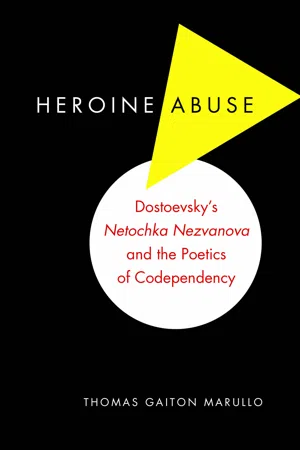
Heroine Abuse
Dostoevsky's "Netochka Nezvanova" and the Poetics of Codependency
- 260 pages
- English
- ePUB (mobile friendly)
- Available on iOS & Android
Heroine Abuse
Dostoevsky's "Netochka Nezvanova" and the Poetics of Codependency
About This Book
Fyodor Dostoevsky's first novel, Netochka Nezvanova, written in 1849, remains the least studied and understood of the writer's long fiction, but it was a seedbed for many topics and themes that became hallmarks of his major works. Specifically, Netochka Nezvanova was the first in Dostoevsky's corpus to focus on the psychology of children and the first to feature a woman in a leading and narrative role. It was also the first work in Russian literature to deal with problems of the family.
In Heroine Abuse, Thomas Marullo contends that Netochka Nezvanova also provides a striking example of what psychologists today call codependency: the ways—often deviant and destructive—in which individuals bond with people, places, and things, as well as with images and ideas, to cope with the vicissitudes of life. Marullo shows how, at age twenty-eight, Dostoevsky intuited and illustrated the workings of "relationship addiction" almost a century and a half before it became the scholarly focus of practitioners of mental health. The moral monsters, "infernal" women, children-adults, and adult-children who populate Netochka Nezvanova seek codependence in people, places, and things, and in images, ideas, and ideals to satiate cravings for love, dominance, and control, as well as to indulge in narcissism, sexual perversion, and other aberrant or alternative behaviors. (Indeed, in no other work would Dostoevsky examine such phenomena as pedophilia and lesbianism with such abandon.) Racing from tie to tie, bond to bond, and caught in a debilitating loop that they claim to detest, but sadomasochistically enjoy, the characters in Netochka Nezvanova wreak havoc on themselves and the world. They do so, moreover, with impunity, their addictions moving them from momentary exultation as self-styled extraordinary men and women, through prolonged darkness and despair, and once again, to old and new addictions for physical and emotional release.
Readers of Heroine Abuse will see Netochka Nezvanova as a timeless model in depicting codependency in the world of the twenty-first century as it did in St. Petersburg in 1849. Marullo's original work will appeal to scholars and students of Russian and comparative fiction; to doctors, psychologists, and therapists; to laymen and women interested in relationship addiction; and, finally, to codependents and relationship addicts of all types.
Frequently asked questions
Information
Table of contents
- Table of Contents
- Preface
- The Basics
- All in the Codependent Family (I)
- All in the Codependent Family (II)
- All in the Codependent Family (III)
- Conclusion
- Bibliography
- Notes
- Index